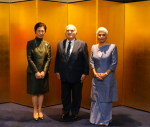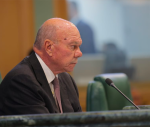You are here
A second Nakba in the making
Dec 09,2019 - Last updated at Dec 09,2019
Two years ago Friday, President Donald Trump formally recognised Jerusalem as Israel's capital. We knew then that this was an irresponsible and cruelly insensitive act that would do grave harm to the rights and well-being of Palestinians and put an end to any pretense that the United States could help negotiate an end to the Israeli-Palestinian conflict. What we did not know was that this dangerous move was only the beginning of the damage Trump would do to Palestinian rights and the prospects for peace.
During the past two years, the Trump administration has: Closed the US Consulate in East Jerusalem, closed the Palestinian consular office in Washington, DC, suspended aid to the Palestinians and to American non-governmental organisations working in the West Bank and Gaza, denied funding to UNWRA, the United Nations agency that provides essential services to Palestinian refugees, removed the designation "occupied" from all official publications and statements referring to the occupied territories; declared that in its view Israeli settlements in the West Bank are not "illegal"; and even gone so far as to deny that Palestinians should qualify as refugees. While each of these acts presents problems on their own, added together the toll they may take on the Palestinian people can ultimately be as devastating as a second Nakba.
In the short span of only two years, President Trump and his administration have attempted to undo all of the gains Palestinians have won during the past seven decades. Because the US has shuttered the Palestine Liberation Organisation office and denied that Palestinian refugees are, in fact, refugees and therefore part of the Palestinian community, the US is saying that it no longer sees Palestinians as a national community deserving of recognition and the right to self-determination. Because the US has repeatedly given carte blanche to every Israeli whim, regarding Jerusalem, refugees, and settlements, they have left Palestinians particularly vulnerable to more extreme Israeli measures, annexation, massive land seizures and even expulsion. And because the US has flaunted its contempt for the rule of law and international norms of behaviour, they have created a far more dangerous and precarious world in which any regional power backed by the US can act with impunity and suffer little or no repercussions for their behaviour.
I sometimes wonder if this is what the the “Deal of the Century" is supposed to look like. Maybe, all along, it was intended to be nothing more than what they have been doing for the last two years, creating a nihilistic order in which the Israelis are free to act out their most extreme fantasies while vulnerable Palestinians are forced to inhabit a dystopian world in which they have no rights and no recourse open to them. It is for this reason I suggest that the cumulative impact of what Trump has done has created the conditions for a second Nakba.
There are, of course, avenues open before us that provide ways to avoid such a disaster. While the US has created this mess on its own, each and every one of its moves have been rejected by the Arab States and the overwhelming majority of the nations of the world. For example, only a smattering of minor US dependencies have considered joining the US in moving their embassies to Jerusalem; last month, by a vote of 170 to 2, the United Nations reaffirmed its support for UNWRA; and then there were the denunciations issue by the Arab States and the Europeans to the new US position on Israeli settlements.
The problem is that while the Trump Administration has become increasingly politically isolated by its reckless behaviour, they have not been effectively challenged. To change the current downward spiral dynamic that is unfolding in the Israel-Palestinian arena is a bold confrontation of both the US and Israel. Statements or resolutions will not suffice, since they are routinely dismissed and ignored. What is required is that other nations say "enough is enough" and tell the US that its days of hegemonic control over the "peace process" have come to an end. Israel too must be confronted and made to pay a price for its lawless behaviour and gross systematic violations of Palestinian human rights.
Of course, a unified Palestinian response utilising a campaign of non-violent resistance would also be important, but I hesitate to place emphasis on this factor for two reasons. First, the burden of doing the heavy lifting should not rest on the most vulnerable party to the conflict. And even if the Palestinians were to rise up, as they have before, unless the nations of the world were ready to challenge both the US and Israel, their resistance would come to a bloody end.
We are running out of time. If action is not taken soon, we may well see a second, and potentially more devastating, Nakba. If it occurs, the responsibility for this tragedy will fall not only on the Israelis who carry it out and the US that aided and abetted them, it will also fall on the nations of the world who failed to act in time to stop this tragedy from occurring.













